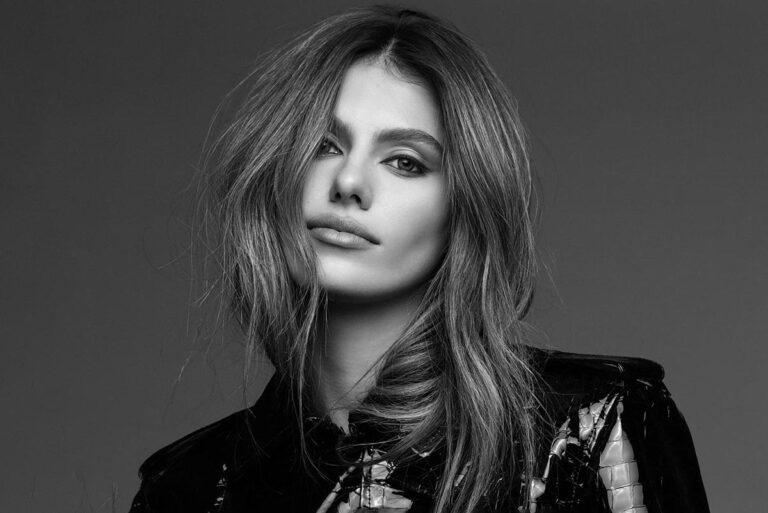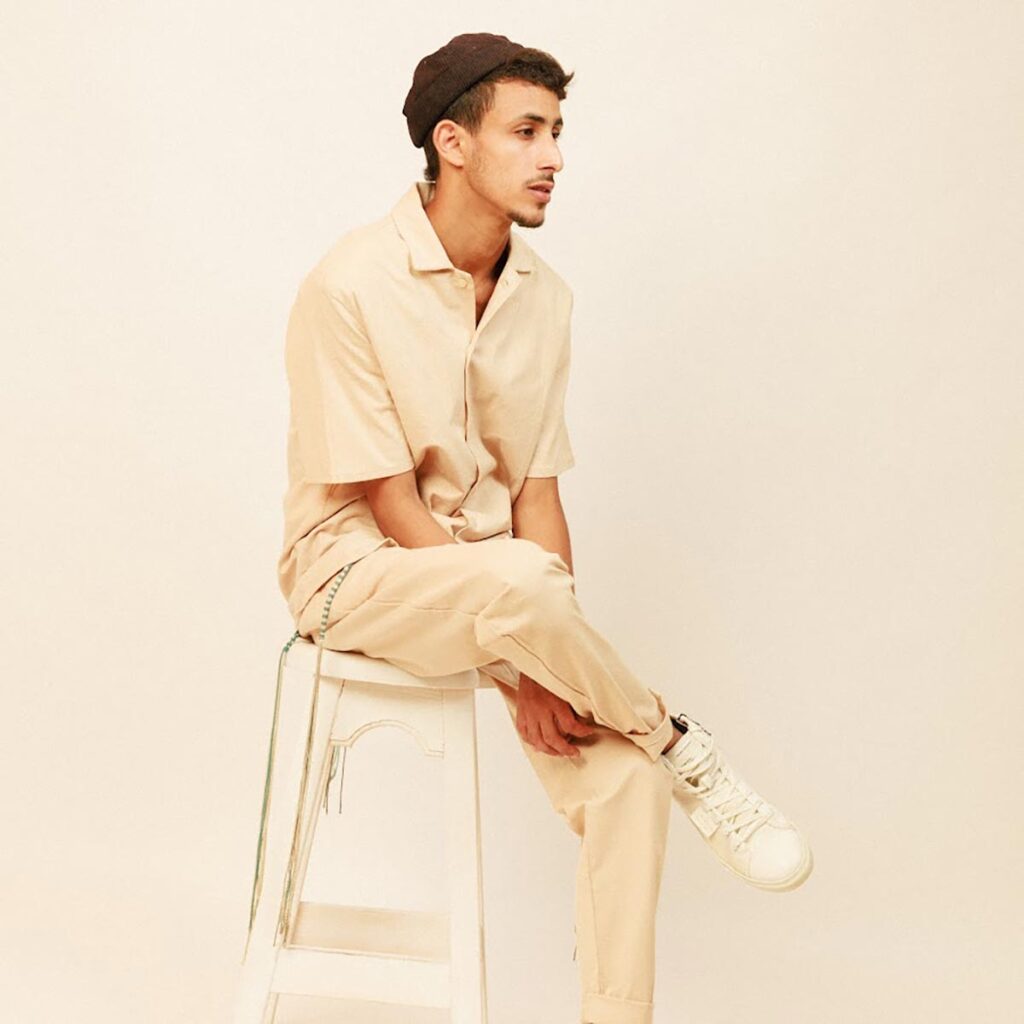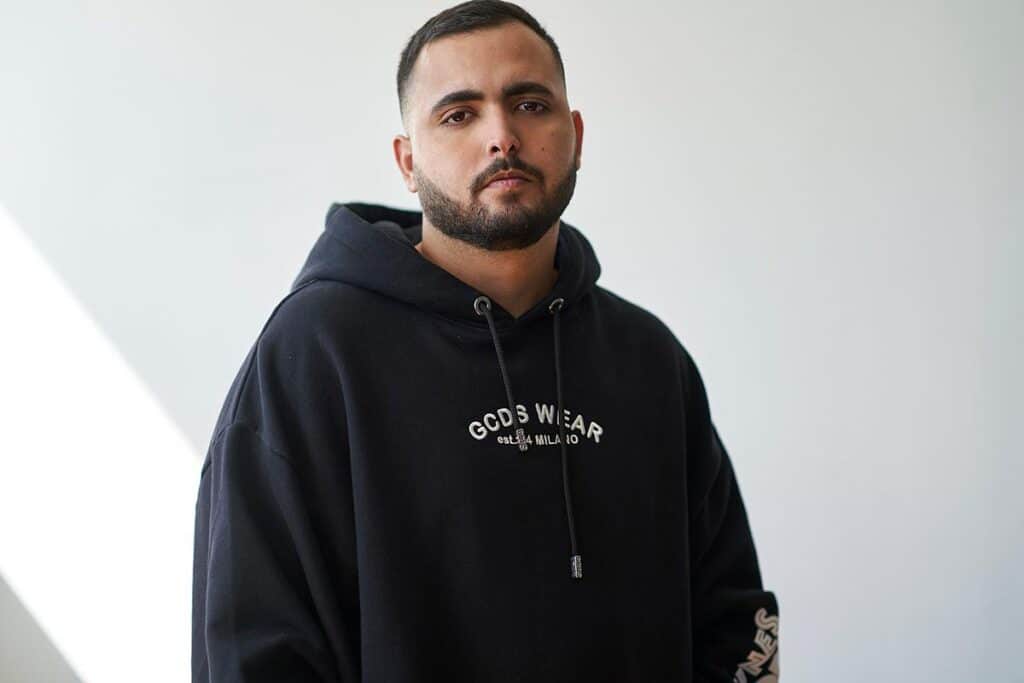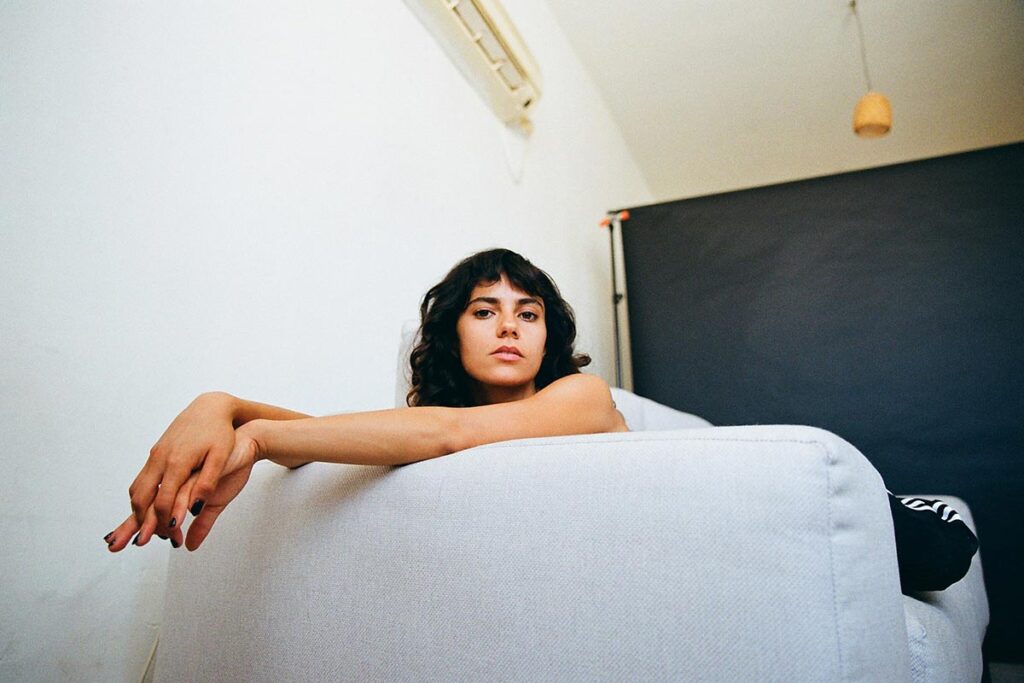
The rich history of Israeli music spans a wide spectrum ranging from the slow melodies of European folk songs and soulful Middle Eastern sounds to the comedic lyrics of 60s’ rock and pop — all reflecting the diversity of Israeli culture.
In today’s vibrant Israeli music scene, a new wave of artists is taking center stage. Spanning genres from rap and alternative to Mizrahit and EDM, these musicians are driving the future of Israeli music.
Here are six up-and-coming Israeli artists leading a musical evolution in 2024.
Read more: Listen to the top Israeli songs that have been released since Oct. 7
Shir David Gadasi
Shir David Gadasi is redefining Mizrahi music, a genre that blends traditional tunes of Middle Eastern communities (in Gadasi’s case, Yemenite melodies) with contemporary sounds.

Born in Elad, Israel, to a Yemenite Breslov Hasidic family, Gadasi was naturally drawn to music at an early age. He’s the nephew of the renowned singer Avener Gadasi and the son of Yair Gadasi, a pioneer in layering biblical lyrics with contemporary tunes.
In a recent interview on Channel 11, Shir David shared his deep connection to Mizrahit: “For years, we’ve been in a home that was raised on musical values, be it tradition or outside influences. My uncle always sang, as did my father at home, and the older music of Chaim Moshe and Zohar Argov resonated everywhere.”
During his IDF service as a combat soldier, Gadasi joined the military band as a lead singer.
Bridging tradition and modernity in his music, Gadasi integrates ancient Yeminite prayers into his songs and often performs in traditional attire like the dishdasha and fez. He also collaborates with some of Israel’s leading rap and alternative artists.
His collaboration with alternative artist Atar Mayner on “Chaverim,” a melodic fusion of prayer and rap, epitomizes this versatility.
His 2023 hit, “Levad Bamidbar,” weaves biblical themes and imagery with a classic Mizrahi style, set to the tune of a catchy pop song.
Odeya Azoulay
Since bursting onto the scene, Odeya Azoulay has quickly become a dynamic presence in pop, artfully melding personal narratives with recognizable Israeli motifs and eclectic rhythms.
Raised in a religious household in Bat Yam, Israel, Azoulay’s love for music and writing blossomed at a young age. In conversation with Channel 24, she reminisced, “I wanted to learn about the world of creatives, especially the history of art and music.”
Drawing on this newfound knowledge and her life experiences, Azoulay wrote her own lyrics, requesting feedback from established Israeli artists. But for Azoulay, the magic isn’t just in the writing, it’s in the art of crafting a song.
Influenced by fellow Israeli artists such as Ivri Lidir, Natan Goshen, and Edan Reichel, Azoulay also notes the impact of classic Mizrahit and hip-hop on her distinct sound.
Azoulay launched her music career while serving in the IDF and dropped her debut hit “HaAhava Shelanu” in 2019. The song quickly amassed over half a million YouTube views, making her an emerging sensation.
The following year, Azoulay released her hit “Or,” which showcased her unique style and topped the Galgalatz radio charts.
Her collaborations with celebrated artists like Omer Adam have further elevated her reputation. In 2022, the release of her hit song and album “HaEmet” cemented her place in the modern Israeli music scene.
Infused with Middle Eastern beats and hints of hip-hop, rap, and pop, Azoulay’s music signals a new generation of relatable yet revolutionary music.
Osher Cohen
Osher Cohen is more than just a singer — he’s a true craftsman in the Israeli music world.

He currently has 13 songs on Apple Music’s “Israel: Top 100” chart and is one of Israel’s leading artists. Drawing inspiration from his Middle Eastern background, Cohen’s songs marry rising ballads and profound lyrics with a voice that tugs at the heartstrings.
Growing up in Kiryat Bialik, Israel, Cohen was constantly immersed in the classic Mizrahi melodies that filled his home, courtesy of his father, the late singer Ilan Cohen. His love of music earned him early entrance to the Kiryat Bialik Conservatory.
Even during his military service, Cohen remained committed to music. Despite not being a part of the official military band, he dedicated his days off to performing. In a recent Channel 24 interview, Cohen expressed gratitude for his musical upbringing, crediting his parents for programming him for the world of music, a love he cultivated over time.
Cohen has mastered multiple aspects of the artistic process, from composing to singing, producing and writing, and playing various instruments. He has collaborated with Sarit Hadad, Omer Adam, Eyal Golan, and Noa Kirel.
His recent album “Part II” features the standout tracks “Ahava” and “Kacha VeKacha,” solidifying his evolving prominence as a multifaceted artist in the Israeli musical landscape.
ShrekDiMC
Shai Horovitz, AKA ShrekDiMC, is redefining rap music, skillfully combining Israeli undertones with global traditions of the genre.
Growing up in Shaarei Tikva and raised in a nationalist religious family, Shrek’s fascination with hip-hop started at age 14. By 2016, he launched his rap segments on YouTube and began facing off in rap battles with Israel’s top hip-hop talents.
Early in his career, Shrek partnered with rapper Zukosh, producing numerous hits and two albums. After parting ways in 2021, their joint fanbase’s support bolstered Horovitz’s solo career, which took off in 2022 with the release of his debut album “Repertoire.”
In 2023, his hit song “Chaiyati,” a collaboration with popstar Roei Adam, claimed the 56th spot on Mako’s “Hitlist” chart. The momentum continued when Omer Adam covered his track “Satlot,” landing Shrek’s original onto Apple Music’s “Israel: Top 100.”
In a recent podcast, “Kol Acher,” Shrek defined his rap style as an evolution of past artists with a twist, saying, “I’m not just influenced by other artists; I continue their path… My aim is to intertwine rap, rhymes, and silsulim (musical trills).”
Reflecting on Israel’s musical melting pot, he stressed his role as a voice for all, focusing on his commitment to inclusivity and universal love in music.
Rooted in the global hip-hop tradition and layered with both his local and national culture, Shrek’s music embodies the core of the modern Israeli soundscape — expressive, authentic, and universally appealing.
Valerie Hamaty
Valerie Hamaty embraces her Arab-Israeli identity through her music. Her chart-topping tunes flawlessly blend language and rhythm, bringing her multicultural heritage to the forefront.
Born to an Arab-Christian family in the historically rich and diverse city of Jaffa, Hamaty discovered her passion for music at age 7 in her community’s orchestra.
Her studies at the Rimon School of Music laid the foundation for her musical career, culminating in her second-place win on the Israeli singing show, “The Next Star.” Inspirations like singer Miri Mesika and renowned popstar and lyricist Keren Peles have significantly shaped her musical vision.
In 2021, Hamaty opened for Noa Kirel at Hayarkon Park and released hit single “Kacha Levater,” a song that highlights her ability to fuse Middle Eastern instruments with pop beats and multilingual lyrics.
The following year, Hamaty performed in the Israeli Independence Day torch-lighting ceremony at Mount Herzl — a testament to her influence on Israeli culture.
In a heartfelt chat with N12, Hamaty reflected on her dual identity: “There’s always a desire to fit in with the majority. There’s something about being different, something unique – that the majority doesn’t know — for me, what distinguishes me is an advantage…That’s how they will remember me.”
It’s this delicate balance that backdrops Hamaty’s music with an enchanting blend of cultures and languages.
Her latest hit “Maaroof” not only pushes her artistic journey forward but also welcomes a new and inclusive era of multicultural music in Israel.
Yasmin Moallem
Yasmin Moallem is skyrocketing to the top of the charts and staying there. Three years ago, she was balancing work as a bartender and waitress in Tel Aviv’s Levinsky neighborhood.

Now, drawing inspiration from her life and childhood memories from Jaffa, she seamlessly channels raw emotion, heritage, and religious faith into songwriting.
Moallem’s music beautifully encapsulates Israeli womanhood, stretching across genres like hip-hop and R&B to Mizrahit.
Her collaboration with Israeli rapper Tuna on hit song “Sahara” catapulted her into the limelight. Moallem views “Sahara” as an unexpected gift, evolving from a guest appearance at Tuna’s concert to a staple at her own shows.
In her recent album “Ein Olam,” she explores her evolving relationship with her newfound fame.
In a feature on Channel 12, Moallem elaborated, “I’m very, very self-critical. I didn’t sing well enough, I wasn’t good enough, I wasn’t present enough. There are people who can step onto an open stage and fake life…those are the people I’m very jealous of.”
Moallem’s musical journey began after her IDF service in 2015. By 2018, her undeniable talent won her the prestigious “Shirmon” competition at the Rimon School of Music. Her 2020 debut album “Arye” further spotlighted her, with “Mesibah” garnering 7 million Spotify streams.
The pandemic, while challenging, was a catalyst in Moallem’s career. Her music surged in popularity across all digital platforms, leading to a feature on Forbes’ “30 Under 30” list in 2022 and a spot on Galgalatz’s yearly music roundup.
Today, Moallem stands out as an artist who isn’t afraid to chronicle the highs and the lows. Her vulnerability continues to attract an Israeli audience from all walks of life.
Originally Published Jan 19, 2024 03:23PM EST
